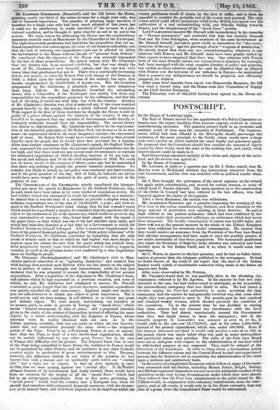POSTSCRIPT.
Is the House of Lords last night, The Earl of Danny moved for the appointment of a Select Committee to inquire into the injury resulting from noxious vapours evolved in certain, manufacturing processes. The question pressed itself in an economic and sanitary point of view upon the attention of Parliament. The improve- ments which had been effected in the Metropolis should encourage the extention of the same principle to the North, where works upon a large scale were carried on, which emitted the most deadly and poisonous gases. He proposed that the Committee should first consider the amount of injury caused by these works, next the state of the existing law, and, lastly, what improvements could be made in it.
Earl GRANVILLE concurred entirely in the views and objects of the noble Earl, and the motion was agreed to.
In the House of Commons,
Mr. LA:YARD, in reply to a question put by Sir J. Duke, stated, that M. Mercier went to Richmond without any instructions whatever from his own Government, and his visit was attended with no political results what- ever.
Sir J. HAY brought the grievances of the naval captains on the retired list again under consideration, and moved for certain returns, to some of which Lord C. PAGET objected. The main question as to the construction of the Order in Council had been referred to the law officers, who had reported against the claims of the captains.
After a short discussion, the motion was withdrawn.
Mr. ALGERNON EGERTON put a question respecting the working of the Poor Law in the cotton manufacturing districts, and drew attention to the
large amount of destitution now existing in those districts. He paid a.
high tribute to the patient endurance which had been exhibited by the operatives under their protracted sufferings, an endurance which had never
been surpassed. The weekly consumption of cotton was 45,000 bales, and
there wits not at the present moment in the whole of the United Kingdom more than sufficient for seventeen weeks' consumption. He trusted that they would receive an assurance from the President of the Poor Law Board that efficient arrangements had been made to meet the possibly greater, if not entire destitution of that dense population. The honourable gentleman also asked the Secretary of State for India whether any reduction had been decided upon in the Indian Tariff, and if so, when it would come into operation.
Sir C. WOOD, in answer to the last question, said he had no fuller infor- mation at present than the telegram published in the newspapers. He had
no doubt known of the truth of the report that the state of the Indian finance would admit of considerable reduction being made in the duties on imports into India.
After some observation by Mr. Parrett,
Mr. VILLIERS stated that he was painfully alive to the alarming cir- cumstances referred to by Mr. Egerton. In his anxiety he had not only
attended to the case, but had endeavoured to anticipate, as far as possible, the extraordinary emergency that was likely to arise. He had issued a circular urging the Poor-law authorities to make provision for that emergency, and the answer he had generally received was, that come what might, they were prepared to meet it. For months past he had required and obtained weekly returns, which showed precisely the condition of the operatives. Up to the present time he was justified in stating that these returns did not warrant any interference with the local authorities. They had almost unanimously assured the Government that they had ample means to meet the emergency ; and if the rateable property in Lancashire was assessed at even 4s. or 5s., it would yield in the one case 12,770,0001., and in the other, 1,824.0001., instead of the present expenditure, which was under 500,000/. Even if the distress increased one-third it would only involve a rate of ls. 10d. in the pound, which was mach below what was paid in many metropolitan and provincial unions and parishes. The rules of the Poor Law Board were not so stringent with respect to the administration of out-door relief to able-bodied paupers as was supposed. They could be relaxed at the discretion of the Guardians. In order to bring about a harmonious action between the different unions and the Central Board he had sent experienced persons into the district to aid in organizing the administration of the rates upon a uniform and satisfactory basis.
In the course of a lengthened discussion which followed, many of the mem- bers connected with the district, including Messrs. Potter, Bright, Bazley, and Hibbert expressed themselves warmly as to the admirable conduct of the operatives in the very trying circumstances under which they were placed. They believed that the Poor Law administered in the spirit stated by Mr.
Villiers would, in conjunction with voluntary contributions, meet the emer- gency, and, at all events, it would only be in the direst extremity that any , idea of a grant from the Consolidated Fund would be entertained.






























 Previous page
Previous page